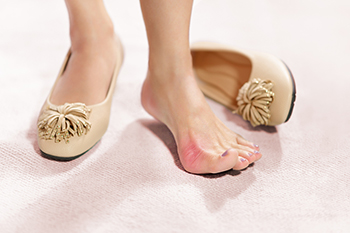

A bunion can develop due to genetic reasons or from wearing shoes that do not have adequate room for the toes to move freely. Additionally, there may be medical reasons why bunions develop, including arthritis, or a weakness of the joint. A bunion is defined as a bony protrusion that forms on the bottom of the joint in the big toe, and it can be quite uncomfortable while wearing shoes. The symptoms that many patients experience can include stiffness in the big toe, and the toe may be swollen. With larger bunions, a corn or callus may develop on top of it as a result of the toe rubbing against the shoe. Relief may be found by wearing shoes that are flat, and fit correctly. Some patients find that it helps to cover the bunion with a pad, and this may help to reduce the friction. A bunion is considered to be a deformity, and if you have this condition, it is advised that you are under the care of a podiatrist who might perform surgery for permanent removal.
If you are suffering from bunions, contact Dr. Edward D. Hutson of Easton, PA. . Our doctor can provide the care you need to keep you pain-free and on your feet.
What Is a Bunion?
A bunion is formed of swollen tissue or an enlargement of boney growth, usually located at the base joint of the toe that connects to the foot. The swelling occurs due to the bones in the big toe shifting inward, which impacts the other toes of the foot. This causes the area around the base of the big toe to become inflamed and painful.
Why Do Bunions Form?
Genetics – Susceptibility to bunions are often hereditary
Stress on the feet – Poorly fitted and uncomfortable footwear that places stress on feet, such as heels, can worsen existing bunions
How Are Bunions Diagnosed?
Doctors often perform two tests – blood tests and x-rays – when trying to diagnose bunions, especially in the early stages of development. Blood tests help determine if the foot pain is being caused by something else, such as arthritis, while x-rays provide a clear picture of your bone structure to your doctor.
How Are Bunions Treated?
If you have any questions, please feel free to contact our offices located in Easton, and Northampton, PA . We offer the newest diagnostic and treatment technologies for all your foot care needs.